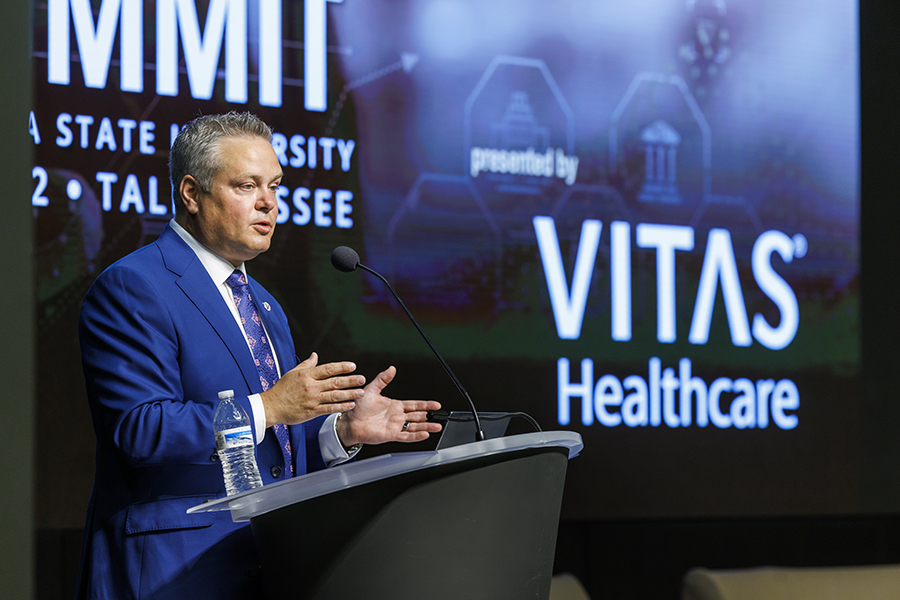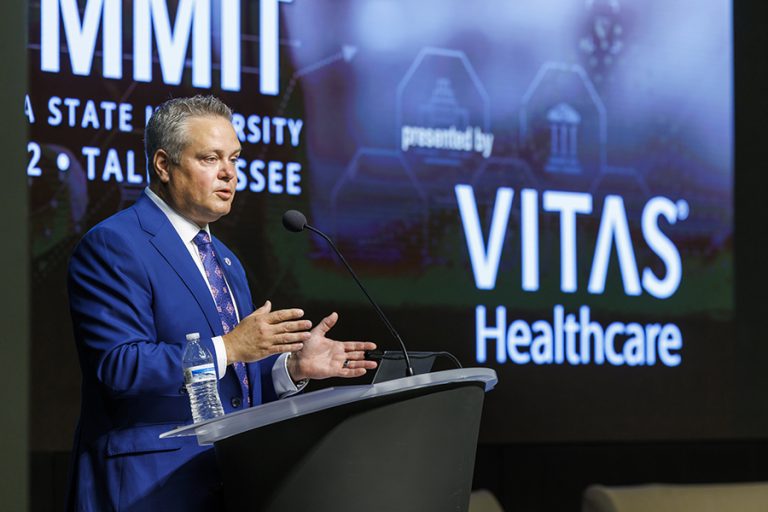
Rather than seeking one-off solutions to state and national healthcare challenges, healthcare executive Nick Westfall challenged industry leaders to embrace continuous evolution.
“While the system is broken, this theme is always 'go and fix it,'” he said. “I don't like that comment because fixing it means there's an end to it. It's constantly evolving, and the needs of our community constantly evolve. We need to embrace it.”
Westfall, chairman and CEO of Miami-based Vitas Healthcare, gave a keynote speech at the 2025 Healthcare Summit at Florida State University last week. Vitas Healthcare, the country's largest independent hospice and palliative care provider, served as an extension of the FSU Health Initiative for its second annual event, a company at FSU Business College and universities.
The summit will fill the Augustus B. Turnbull III Florida State Conference Center with approximately 260 participants, reflecting the sold-outs at last year's first event. Participants included medical executives, government officials, nonprofit organizations, university staff, faculty, MBAs and undergraduate volunteers who served as FSU ambassadors.
Four panels of experts answered questions and discussed urgent topics such as cost, accessibility, funding, automation, artificial intelligence, cybersecurity, provider shortages, and quality of care.
“We need a partnership.”
“Healthcare is personal,” FSU president Richard McCullough told attendees. “It touches us, our families, our lives, our community and we take this responsibility incredibly seriously.”
McCullough highlighted the University and FSU Health's commitment to improving local health care through the Academic Health Initiative. The plans include the construction of the Acute Care Hospital in Panama City Beach, announced last month, and the emerging academic health center at the Tallahassee Memorial Healthcare Campus, which is scheduled to open in 2026.
“Nothing happens in a vacuum. We need partnerships,” McCullough said. “People need to come together for a shared purpose. That's why this summit looks at the clinical and clinical aspects of healthcare.”
Summit host Michael Hartline, dean of FSU College of Business, said the event seized the opportunity to bring together top national, state and local experts “to discuss and resolve the most pressing issues facing the healthcare industry.”
Keynote speaker Westfall highlighted the importance of eliminating silos among healthcare professionals.
“We recommend disappointing our guards and talking about what we can do together,” he said. “We've all become useful to others.”
Westfall highlighted demographics that highlight the need for innovation in Florida.
“Around 22% of the state's residents are over 65,” he said. Meanwhile, seniors continue to be poured into the state, creating the urgency of solutions as Florida's health care system is increasingly adapted to serving the elderly population with complex needs. Research shows that 80% of people over the age of 65 have at least one chronic condition, and 68% have two or more chronic conditions.
Westfall urged participants to “think about challenges to the status quo, confusing what we're doing and not being able to focus on the negatives. Things can improve.”
He added: “I'm also here to tell you that there's a lot of money and appetite in addition to federal and state funding that I want to be deployed to support all aspects of healthcare.”
“Focus on great operators”
Erin James Coward, an Atlanta-based managing director and panelist at the Bank of South and Southeast Healthcare Services at JPMorgan Chase, discussed changes in healthcare investment strategies.
Focusing on cases where investors lost money by betting on overvalued companies, Coward said she has seen investors focus on strong management and profits over the next few years.
“You really need to understand the economics of your unit,” she told attendees. “We really need to understand how our revenue model works. It's not growing anymore. Focusing on great operators is where we're headed.”
Industry leaders distinguish between healthcare integration and integration, and note that the latter does not necessarily lead to better results.
Panelist Jim Boiman, vice president of Guidewell Health, said: “If we are truly successful in integration, you are answering the affirmative question: “Do you feel like patients are more connected and caring?” ”
Panelist Meamieu, president and CEO of the Florida Hospital Association, suggested that everyone is likely to want personal, local, efficient and affordable healthcare.
She then offered hope for the future of healthcare in Florida and the US
“Hope for what is possible”
During the “unprecedented crisis” of the Covid-19 pandemic, Mayhew “sees the level of ingenuity, creativity, innovation, cooperation and partnership.
Jennifer Crew, nurse administrator for practice and digital transformation at the Mayo Clinic in Jacksonville, Florida, also expressed concern and optimism.
As a member of the panel “Disruptive Techniques Transforming AI, Cybersecurity and Healthcare,” Crews said he saw cases in which nurses rely on electronic health records, or EHR, automated tasks integrated into systems.
Meanwhile, the crew highlighted the pilot program (AI-based ambientry tool) in which Mayo Clinic is incorporated into nurses into the inpatient environment.
She said nurses told her “very thoughtful and verbal walking through physical assessments with patients helps improve clinical skills.”
In his keynote speech, Westfall urged participants to “maximise every minute of today,” and “going out of here another nugget's way of disrupting the whole health care system or two more.”
And to the student at the event, he said: “I hope you leave for work, and I hope you leave inspired by the way that will move things forward, as it takes away the army.”

